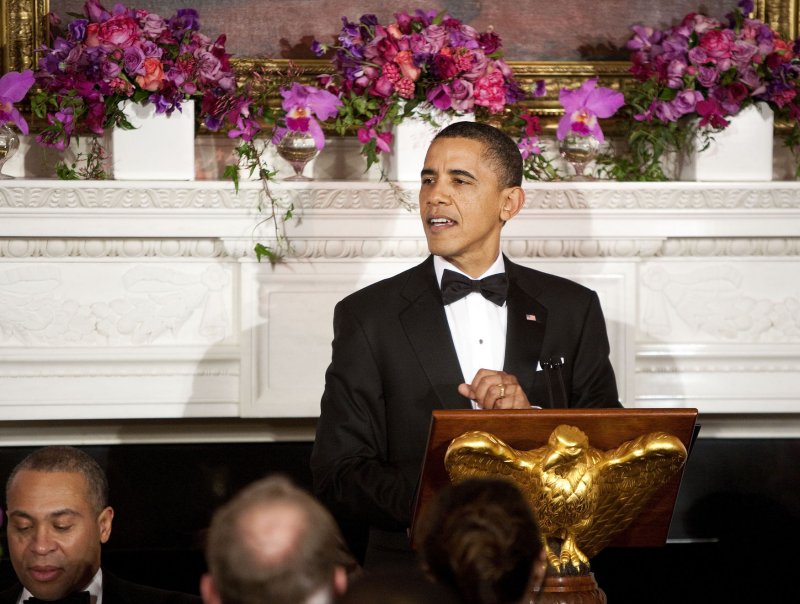1 of 2 | U.S. President Barack Obama speaks at the Governors Dinner at the White House Feb. 27, 2011. UPI/Joshua Roberts/POOL |
License Photo
WASHINGTON, Feb. 28 (UPI) -- A no-fly zone over Libya and exile remain options for pressuring Libyan leader Moammar Gadhafi to leave, White House officials said Monday.
When discussing a no-fly option, U.S. Ambassador to the United Nations Susan Rice said it was an avenue world leaders are "actively and seriously" considering.
"(These) talks are under way with our partners in NATO and elsewhere," Rice said during a readout of President Obama's meeting with U.N. Secretary-General Ban Ki-moon. "We have made clear that it is an option that we are considering and considering actively and seriously."
She said the question of providing material support to anti-government rebels seeking Gadhafi's ouster were premature, explaining any action would have to wait until it is learned who will emerge "as the critical opposition elements … (and) how the opposition will coalesce."
White House press secretary Jay Carney said exile also was an option.
"And it would be a quick option," he said. "And it would comport with our desire to see him step down and remove himself from power.
The international community is interested in seeing an end to Gadhafi's treatment of Libyan citizens, Carney said.
"And if exile is a quick option to make that happen, we would support that," Carney said. "But he and others will be held accountable for their actions regardless."
Responding to a question about Gadhafi's remarks to several reporters that he would not leave and his surprise at U.N. action against him, Rice said, "It sounds just, frankly, delusional."
"And when he can laugh in talking to (journalists) while he is slaughtering his own people, it only underscores how unfit he is to lead and how disconnected he is from reality," Rice said.
Asked about what has been perceived as a slow response by Obama, Rice said, "(It) is up to the Libyan people, and we will continue to be very supportive of their efforts to achieve the universal rights and the freedoms and the opportunity that they are seeking."
She said she thought the United States has been extremely clear about "what is right and what is moral" in this situation and has taken strong and swift actions in response. She noted that the U.S. unilaterally imposed sanctions on Libya and worked with the United Nations to impose sanctions as well.
Obama and Ban discussed the situation in Africa and the Middle East, particularly the situation in Ivory Coast, with both expressing concern about the need to enable the legitimately elected president, Alassane Ouattara, to assume responsibility for governing the country, Rice said.
The two leaders also discussed their common agenda of building on the strengths of the United Nations while pursuing and implementing management reforms and budgetary discipline, Rice said.
"(Finally), President Obama reaffirmed the administration's strong belief that the United Nations continues to play a vital role in addressing tough global and transnational threats," the ambassador said. "And in doing so, its work enhances the safety and well-being of the American people."















